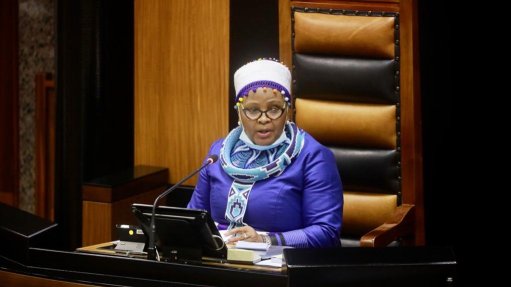
South Africa's National Assembly speaker Nosiviwe Mapisa-Nqakula
JOHANNESBURG (miningweekly.com) – National Assembly speaker Nosiviwe Mapisa-Nqakula on Monday urged heads of the world's Parliaments gathering at the 144th plenary assembly of the Inter-Parliamentary Union to undertake all necessary efforts to deal with climate change through oversight and the constitutional powers of the institutions they lead.
Mapisa-Nqakula stated that in South Africa, Parliament supported the government’s view, articulated by President Cyril Ramaphosa, on a green recovery for the country, and COP26's legislative prescripts of safeguarding the planet’s ecosystems by reducing greenhouse gas emissions and limiting global temperature increases.
“The hardest hit population groups are poor people. These are, in the main, inhabitants of developing countries who are predominantly farmers who depend on rain-fed and basic mechanisms for tilling the land and earning a livelihood.
"The only way their conditions can change is through policy shifts. Critical to this, is dedicated action on the part of policy-makers and the people who represent them, like legislators and members of Parliament. Great changes throughout history have been born out of crises − we should therefore not waste this moment,” Mapisa-Nqakula said, in recognising that tackling climate change had far-reaching implications for socioeconomic development, production and consumption patterns.
The plenary assembly is currently underway in Indonesia, Bali, where Mapisa-Nqakula is leading a multiparty delegation of senior members of the South African Parliament to the Inter-Parliamentary Union assembly.
The theme of the 144th session is getting to zero by mobilising Parliaments to act on climate change and Mapisa-Nqakula enjoined the assembly to reflect on the the need to mobilise Parliaments to act swiftly in reducing its negative effects.
She described tackling climate change as having far-reaching implications for socioeconomic development, production and consumption patterns, and said it remained a serious global threat to national and international development.
Moreover, its impact had continued to exacerbate at a time when the world was still dealing with the aftermath of Covid.
The manner in which climate change affected people depended on location on the global map.
In addition to fighting climate change, the work of the Inter-Parliamentary Union includes building strong democratic Parliaments, advancing gender equality, promoting human rights, contributing to peace-building, resolving conflict, fostering inter-parliamentary cooperation, promoting youth empowerment, mobilising Parliaments around the global development agenda, and bridging the democracy gap in global governance.
Besides Mapisa-Nqakula, the South African delegation includes National Council of Provinces deputy chairperson Sylvia Lucas, National Assembly House chairperson Cedric Frolick, ANC deputy chief whip Doris Dlakude, ANC MP Fikile Masiko, DA MP Dr Annelie Lotriet, and EFF chief whip Floyd Shivambu.